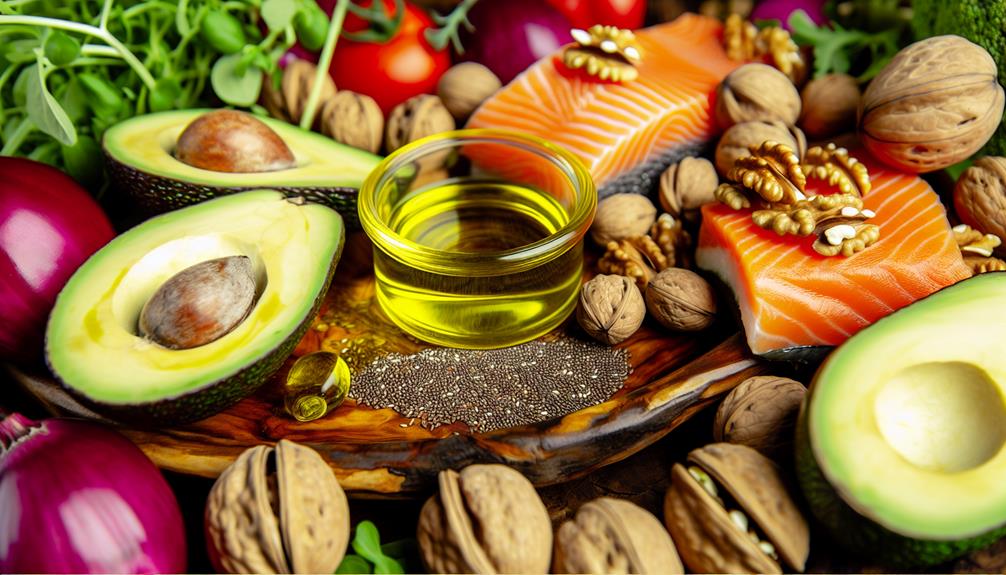I've discovered that making specific dietary changes can boost men's hormonal health. First, I increase healthy fats, like omega-3s from fatty fish and nuts, to support hormone production. Then, I prioritize protein intake with lean meats and plant-based options, spreading it throughout the day. Embracing whole foods helps eliminate processed options that disrupt balance. Limiting processed sugars is essential; I opt for fresh fruits and natural sweeteners instead. Finally, staying hydrated by drinking plenty of water keeps hormone levels stable. By adopting these changes, I've noticed improvements, and there's more actionable advice to explore.
Increase Healthy Fats

Increasing healthy fats in your diet can greatly benefit your hormonal health. I've found that focusing on the right fat types, especially omega sources, can make a significant difference. Omega-3 and omega-6 fatty acids are essential for hormone production and regulation. These healthy fats help balance testosterone levels, which is vital for men's overall well-being.
You might be wondering where to find these omega sources. Fatty fish like salmon, mackerel, and sardines are excellent choices. They're rich in omega-3s, which not only support hormonal health but also have anti-inflammatory properties. If you're not a fan of fish, consider incorporating flaxseeds, chia seeds, or walnuts into your meals. These plant-based options are great sources of omega-3s as well.
It's important to balance omega-3s with omega-6s, found in oils like sunflower, corn, and soybean oil. While omega-6 fatty acids are necessary for health, too much of them can lead to inflammation and hormonal imbalances. Aiming for a healthier ratio between these fat types can enhance your hormonal function.
Replacing saturated fats found in processed foods with healthier options, like avocados, nuts, and olive oil, is another effective strategy. Not only do these foods provide essential fats, but they also contain valuable nutrients that support overall health.
Prioritize Protein Intake
When it comes to enhancing hormonal health, prioritizing protein intake is essential. I've found that adequate protein not only supports muscle growth but also plays a significant role in hormone production and balance. Research indicates that protein helps regulate insulin levels and increases the secretion of hormones like glucagon, which is critical for fat metabolism and energy balance.
In my experience, incorporating a variety of protein sources into my diet has made a considerable difference. Lean meats such as chicken, turkey, and fish are excellent choices. They're high in essential amino acids and low in unhealthy fats, which helps maintain ideal testosterone levels. I also recommend exploring plant-based sources like lentils, quinoa, and chickpeas for their added fiber and nutrients. These options can complement your protein intake while promoting overall health.
It's important to spread your protein consumption throughout the day. I aim for a balanced intake at each meal, ensuring I meet my daily protein needs without overloading any single meal. This approach not only supports muscle repair but also stabilizes my energy levels and keeps my cravings in check.
Lastly, don't forget to evaluate the quality of your protein sources. Opt for grass-fed, organic, or wild-caught options whenever possible. Investing in high-quality proteins can provide additional health benefits, including better nutrient absorption and improved hormonal balance. Prioritizing protein intake has become a fundamental part of my dietary strategy for enhancing my hormonal health.
Embrace Whole Foods

One of the best decisions I've made for my hormonal health is embracing whole foods. By focusing on nutrient-dense options, I've noticed significant improvements in my energy levels and overall well-being. Whole foods are minimally processed and packed with essential vitamins and minerals. This means I'm not just filling my plate; I'm prioritizing food quality, which directly impacts my hormonal balance.
When I switched to a diet rich in whole foods, I realized how much better I felt. Here's a quick reference table to help visualize the benefits of different whole food categories:
| Food Category | Nutrient Density Benefits |
|---|---|
| Leafy Greens | High in vitamins A, C, and K |
| Whole Grains | Rich in fiber, supports digestion |
| Lean Proteins | Provides essential amino acids |
| Healthy Fats | Supports hormone production |
| Fresh Fruits | Packed with antioxidants and fiber |
Incorporating these food categories into my diet has been a game changer. Whole foods provide the nutrients my body craves, while also eliminating empty calories found in processed foods. This shift not only enhances my physical health but also supports my mental clarity and emotional well-being.
If you're looking to improve your hormonal health, I highly recommend embracing whole foods. They're a simple yet powerful way to guarantee you're nourishing your body effectively and maintaining that vital hormonal balance.
Limit Processed Sugars
Although it might be tempting to indulge in sugary snacks, limiting processed sugars has been essential for my hormonal health. I've learned that excessive sugar intake can lead to spikes in blood sugar levels, which can throw off my hormonal balance. When I consume too much sugar, my body releases insulin to manage those spikes, and over time, this can lead to insulin resistance—a major issue for hormonal health.
I've started to swap out processed sugars for healthier sugar alternatives, like stevia or monk fruit. These options not only satisfy my sweet tooth without the same blood sugar impact, but they also help me maintain stable energy levels throughout the day. It's been fascinating to see how small changes in my diet can make a significant difference in how I feel.
I also pay attention to hidden sugars in foods, particularly in sauces, dressings, and snacks. Reading labels has become a regular habit for me, and I'm often surprised by how much added sugar is in seemingly healthy products. By choosing whole foods and preparing meals from scratch, I've managed to keep my sugar intake in check.
Moreover, when I do crave something sweet, I opt for fresh fruits, which provide natural sugars along with fiber, vitamins, and minerals. This strategy helps me satisfy my cravings without compromising my hormonal health. Overall, limiting processed sugars has been a game changer in my journey towards better hormonal balance.
Stay Hydrated

Staying hydrated is essential for maintaining ideal hormonal health. I've learned that proper hydration can greatly affect hormone production and balance, particularly testosterone and cortisol levels. When I make it a priority to drink enough water, I often feel more energized and focused.
Here are some hydration tips I've found useful:
| Hydration Tip | Benefits | Recommended Daily Intake |
|---|---|---|
| Drink water before meals | Reduces appetite | 1-2 cups |
| Carry a water bottle | Promotes consistent drinking | 64 oz (about 2 liters) |
| Infuse with fruits/herbs | Adds flavor and nutrients | Varies by preference |
| Set reminders | Encourages regular hydration | Every hour |
| Monitor urine color | Indicates hydration level | Light yellow is ideal |
Incorporating these tips into my daily routine has made a noticeable difference in my overall well-being. The benefits of water extend beyond hydration; it aids in digestion, enhances physical performance, and supports cognitive function. When I'm well-hydrated, I also notice improvements in my mood and stress levels, which directly influence hormonal balance.
Frequently Asked Questions
How Do Hormonal Imbalances Affect Men's Overall Health?
I remember a time when my mood felt like a rollercoaster—up one minute, down the next. It turned out my testosterone levels were off balance. Hormonal imbalances can lead to mood swings, fatigue, and even weight gain. Research shows that low testosterone can impact not just mood, but overall health too. By addressing these issues, I've seen a significant improvement in my energy and emotional stability, making daily life much more enjoyable.
Can Stress Impact Hormonal Health and Dietary Choices?
Absolutely, stress can greatly impact hormonal health and my dietary choices. When I'm stressed, I often find myself reaching for unhealthy comfort foods, which can lead to further imbalances. Practicing stress management techniques, like mindfulness and exercise, helps me maintain better control over my diet. Dietary mindfulness becomes essential; I focus on whole foods that support my hormones, ensuring I'm not just eating to cope but nourishing my body effectively.
What Are the Signs of Hormonal Imbalance in Men?
I've noticed that signs of hormonal imbalance in men can manifest in various ways. Common symptoms include fatigue, mood swings, and changes in libido. It's essential to focus on symptom identification to address these issues effectively. Lifestyle factors, like diet and exercise, play significant roles in hormonal health. By paying attention to these signals, I believe we can take proactive steps towards restoring balance and improving overall well-being.
Are There Specific Foods to Avoid for Hormonal Health?
When it comes to hormonal health, I've learned that avoiding certain foods can be essential. Processed foods and those high in sugar often contain hormonal disruptors that can throw your balance off. Instead, I've made simple food substitutions, like swapping sugary snacks for fruits or whole grains. This not only helps my hormonal health but also boosts my overall well-being. It's amazing how small changes can make such a big difference!
How Long Will Dietary Changes Take to Show Effects?
Imagine planting a seed and waiting for it to bloom; that's a bit like making dietary changes. The timeframe expectations can vary widely, with some folks noticing effects in a few weeks, while others might take months. Individual variability plays a huge role here—your body's unique chemistry can speed up or slow down the process. Staying consistent with your new habits and being patient is key to reaping the benefits.
